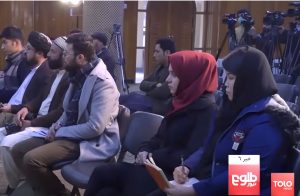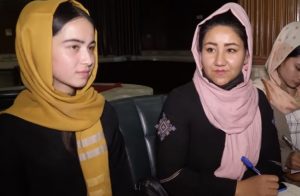London – The attempt by Afghan journalists to defy the Taliban’s order to cover their faces while presenting on television was short-lived: After some appeared on Saturday (21) without a veil, this Sunday (22) the directive was respected.
The move, which further exacerbates Afghanistan’s crackdown on women and journalism, was announced in a statement Wednesday by the Ministry of Promoting Virtue and Preventing Depravity, which replaced the Ministry of Women after the Taliban took over the government.
TOLONews, the main television station in the country, was one of those who accepted the decision, given the risk of penalties and the obligation to dismiss journalists who do not comply with the rule.
Journalists are most affected by the Taliban regime.
The ban on showing one’s face confirms the pessimism of those who do not believe the Taliban’s promise to respect journalism shortly after coming to power in August 2021. Since then, journalism in the country has largely broken down.
According to a poll by Reporters Without Borders, 40% of stand-alone cars stopped working last December.
Women were the most affected. In November, the country’s leaders announced a package of rules for the audiovisual sector.
Women were banned from appearing in fictional programs (for example, soap operas) or entertainment programs, and news anchors were required to cover their heads with a headscarf (Islamic veil).
The research, published in March by the International Federation of Journalists, found less than six months after taking power, 87% of female journalists faced gender discrimination during the Taliban regime, and 60% of them lost their jobs and careers.
read more
Discrimination and fear: The plight of Afghan journalists under the Taliban
The new cover layout strikes those who still resist in the profession. The measure was first announced by Moby Group, which owns ToloNews and several other Afghan TV and radio networks.
On Twitter, the holding said the order was described as “final and non-negotiable”.
Shortly after the ban was announced last week, some hosts posted masked photos on social media while presenting newspapers and programs.
ToloNews presenter Yalda Ali wrote that she was “deleted” on Taliban orders for posting a video of her wearing the accessory on her face.
This #Taliban in a new order, it ordered all female journalists and TV presenters in AFG to wear masks and cover their faces.
Yalda Ali, host @TOLO_TV Famous morning show ‘Bamdad Khosh’ wrote on his IG in response to TBN’s new order: this is me, the eliminated woman. pic.twitter.com/E9x1zJaDA8
— Natiq Malikzada (@natiqmalikzada) 18 May 2022
TOLONews presenter Sonia Niazi said in an interview with AFP on Sunday:
“We opposed and resisted the use of masks. But TOLOnews was pressured and said, without covering his face, that any presenter appearing on the screen should be given another job or simply removed.”
‘Taliban wants to remove journalists from television,’ said host
As soon as the order was announced, two TOLONews presenters cried in the station’s offices in Kabul, reporting to CNN.
“They want women removed from television. They’re afraid of a woman with a good education level,” Khatera, 27, told the American network, a morning newscaster for five months.
د امر بالمعروف نهي نهي او د او فرهنګ فرهنګ وزارتونو موبي ته دې د اعلان مهال دا طعي او قبحث بلی.
د طلوعنیوز د اطلاعاتو دستور افغانستان کېه افغانستان کېه افغانستان رسنیو ته ورکړل شوی دی. ۲/۲#طلوعنیوز— TOLOnews (@TOLOnews) 19 May 2022
TOLONews director Khpolwak Sapai told CNN he was considering shutting down the station after the new order, but resigned to give employees a chance to present with their faces.
In the past nine months, it has seen more than 90% of its personnel flee the country after the Taliban came back to power.
“Female and male journalists and presenters were separated,” Sapai told CNN. “And the producers…. I was alone at the management level,” he said.
The 23-year-old hostestia wept as she questioned what female journalists should do, with more setbacks against the rights won over the past two decades.
“We were ready to fight to keep our job to the end, but they won’t let us.
It’s a psychological and depressing prison, we have no motivation to go out and openly.”
CNN was able to speak to Taliban government spokesman Zabihullah Mujahid about the banning of journalists during the late celebration of May 3 World Press Freedom Day.
He said the fix was “a recommendation from the ministry” and that only “women on TV should wear it” as to the necessity. [a máscara]” compared to the pandemic.
“The mask was mandatory as it was during the Covid-19 pandemic.”
read it too
Discrimination and fear: International Federation shows the plight of journalists in Afghanistan under Taliban
The press is increasingly censored by the Taliban
The Taliban returned to power in Afghanistan after the official government fell in August last year. Since then, the domestic and foreign press and women as a whole have been increasingly oppressed.
In the 1990s, when the Islamist fundamentalist group first took over the country, it demanded that women wear clothes that cover their eyes and search, in addition to banning access to education.
Initially, after returning to power in 2021, the Taliban signaled that it would not re-implement the dress code for women, which had changed in recent months.
A new order, which went into effect in early May, requires all women to wear clothing that only leaves the eyes visible.
The decree states that women should only leave the house when necessary and that male family members will be punished for violations committed due to inappropriate dress.
The Taliban also once again banned girls from going to school after the sixth grade.
In March, the group’s attack on journalists hit three international companies that distribute their content through their Afghan partners.
Local broadcasters were banned from broadcasting the BBC’s Pashto, Persian and Uzbek news bulletins, while a talk show by German DW was banned.
US Congress-funded broadcaster Voice of America (VOA) also took its programs off the air in Afghanistan.
read more
source: Noticias

